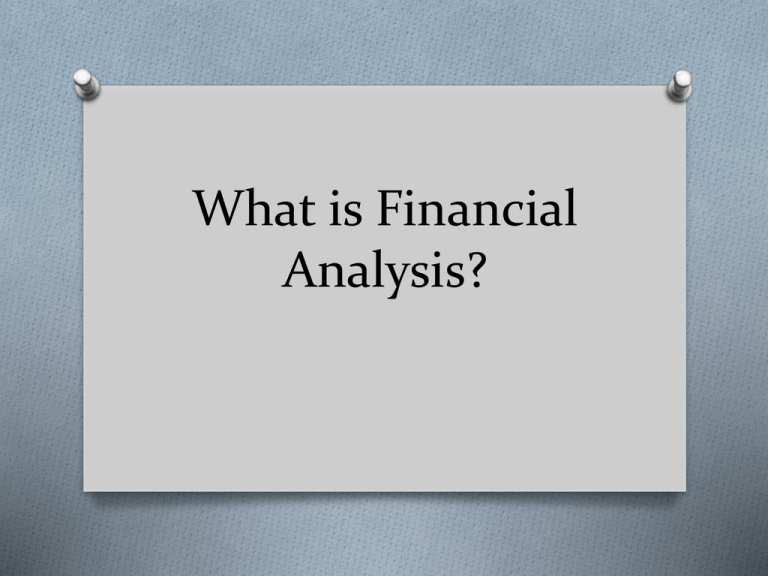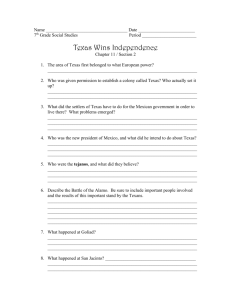
What is Financial
Analysis?
“Copyright and Terms of Service
Copyright © Texas Education Agency. The materials found on this website are copyrighted © and trademarked ™ as
the property of the Texas Education Agency and may not be reproduced without the express written permission of
the Texas Education Agency, except under the following conditions:
1) Texas public school districts, charter schools, and Education Service Centers may reproduce and use copies of
the Materials and Related Materials for the districts’ and schools’ educational use without obtaining permission
from the Texas Education Agency;
2) Residents of the state of Texas may reproduce and use copies of the Materials and Related Materials for
individual personal use only without obtaining written permission of the Texas Education Agency;
3) Any portion reproduced must be reproduced in its entirety and remain unedited, unaltered and unchanged in any
way;
4) No monetary charge can be made for the reproduced materials or any document containing them; however, a
reasonable charge to cover only the cost of reproduction and distribution may be charged.
Private entities or persons located in Texas that are not Texas public school districts or Texas charter schools or any
entity, whether public or private, educational or non-educational, located outside the state of Texas MUST obtain
written approval from the Texas Education Agency and will be required to enter into a license agreement that may
involve the payment of a licensing fee or a royalty fee.
Call TEA Copyrights with any questions you have.
What is Financial Analysis?
O What is financial analysis?
O Evaluating a company’s performance
O Using past data to predict future
performance
O Analyzing financial statements through the
use of ratio analysis, vertical, and horizontal
analysis
O Uses data to assess the wellness of different
areas of a business
O Usually a part of the accounting process
3
Copyright © Texas Education Agency, 2014. All rights reserved.
Accounting and its Purpose
O Accounting
O Is the process of planning, recording,
analyzing ,and interpreting financial
information
O Provides internal information for
management
O Provides external information for potential
investors or stockholders
4
Copyright © Texas Education Agency, 2014. All rights reserved.
Accounting Systems
Type
Pros
Cons
Manual– accounting
procedures without
the aid of a computer
Costs less
Human error, takes
more time, more
difficult to prepare
accounting documents
and statements
Computerized–
accounting solely on a
computer
Less human error,
takes less time
Costs more
Single-entry– similar
to a checkbook
Simpler, ideal for very
small businesses
More errors can be
made
Double-entry– each
debit must have a
credit
More accurate, errors
can be easier to
identify
More complicated
5
Copyright © Texas Education Agency, 2014. All rights reserved.
Fields of Accounting
Financial
Managerial
Cost
Tax
6
Copyright © Texas Education Agency, 2014. All rights reserved.
Financial Accounting
O Provides an overview of a company’s
performance
O Follows GAAP (Generally Accepted
Accounting Principles)
O Mainly for external presentation of
information (such as financial statements)
7
Copyright © Texas Education Agency, 2014. All rights reserved.
Managerial Accounting
O Primarily for internal information purposes
O Aids management functions such as
O Planning, as in budgets
O Organizing, as in carrying out objectives and
monitoring activities
O Control purposes, as in implementing plans
O Decision-making, as in all aspects of product
development
8
Copyright © Texas Education Agency, 2014. All rights reserved.
Cost Accounting
O Actually part of managerial accounting
O Purpose is the cost of conducting business
O Costs of products and services
O Costs of resources
O Costs associated with departments
9
Copyright © Texas Education Agency, 2014. All rights reserved.
Tax Accounting
O Follows IRS rules and regulations
O Used to prepare a multitude of tax
statements and forms
O Looks at profit and loss statements
specifically
10
Copyright © Texas Education Agency, 2014. All rights reserved.
The Accounting Process
INPUTS
collecting
transaction
information through
journal entries
PROCESSING
posting those
journal entries to
the appropriate
ledger accounts
OUTPUTS
turning the ledger
balance information
into financial
statements
11
Copyright © Texas Education Agency, 2014. All rights reserved.
Financial Statements
Balance Sheet– contains assets, liabilities, and
owner’s equity accounts
Income Statement– contains revenue and expense
accounts
Statement of Changes in Owner’s Equity– shows
additions and subtractions to the capital account
during an accounting period
Cash Flow Statement– records cash flow from
operations, from investing activities, and from
financing activities
12
Copyright © Texas Education Agency, 2014. All rights reserved.
Audiences for Financial Analysis
O Outside investors and stockholders
O Internal management
O Creditors, or potential creditors
O Suppliers
O Credit rating agencies
13
Copyright © Texas Education Agency, 2014. All rights reserved.
Post-Secondary Education
O Financial Analysis is important to
many different aspects of a person’s
future including
O College Majors
O Industry Certifications
14
Copyright © Texas Education Agency, 2014. All rights reserved.
College Majors
Finance
Accounting
Insurance
Real Estate
Economics
15
Copyright © Texas Education Agency, 2014. All rights reserved.
Industry Certifications
Chartered
Financial
Analyst®
Certified
Management
Accountant
Certified
Financial
Planner®
16
Copyright © Texas Education Agency, 2014. All rights reserved.
Career Opportunities
O Financial Analysts
O Evaluate the performance of various types of
investments
O Budget Analysts
O Help institutions organize their finances and
prepare budget reports
O Insurance Underwriters
O Analyze applications for insurance to determine
premium and coverage amounts
O Financial Advisors
O Help people with investment advice and financial
decisions
17
Copyright © Texas Education Agency, 2014. All rights reserved.
Independent Practice Assignments
O
Financial Analysis Research Assignment #1
O
O
Group Presentation Assignment #2
O
O
Divide students in groups of three or four, depending upon your class size. Have
students conduct Internet research on accounting and accounting systems. They
should record at least 10 facts each. They will then compare each other’s lists and
narrow the facts down to one list. The list will be posted in the room along with the
other groups’ lists.
Divide students into groups of three to four, again depending upon the class size.
Assign each group a topic or let them draw out of a hat (or box). Topics can
include the fields of accounting, purposes of financial analysis, GAAP principles, or
any other topic. Student groups are to create at least a five-slide presentation with
a handout (even if it is a note-taking document such as Cornell Notes) for the other
students to complete while they are presenting.
Career Opportunities Assignment #3
O
Students will research careers involving financial analysis on any of the career
websites. They will select three careers and will create a Venn diagram with the
three careers in each of the circles. The overlapping sections of the circles should
include the duties, job responsibilities, or educational requirements that are the
same for those jobs. If all three have the same attribute, that goes in the center
overlap. If one particular job has a requirement the same as one of the other jobs,
it goes in the overlap between those two jobs, not in the center because it is only
particular to two of the three jobs. This can be done on the computer, flip chart
18
paper, or any other medium available.
Copyright © Texas Education Agency, 2014. All rights reserved.







